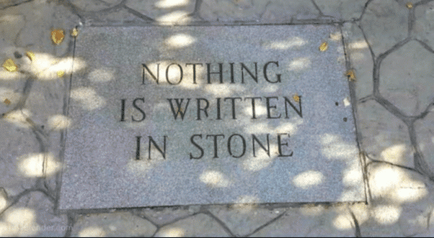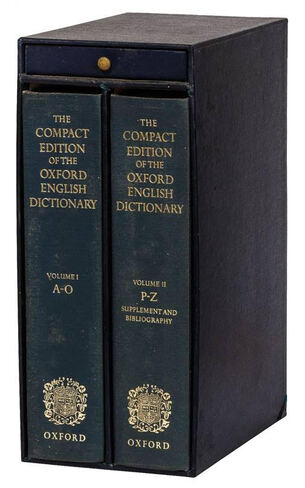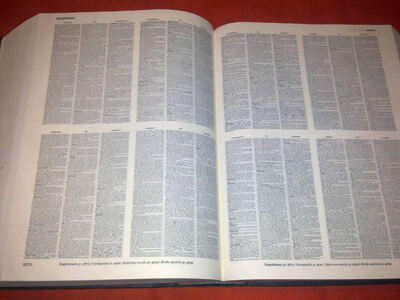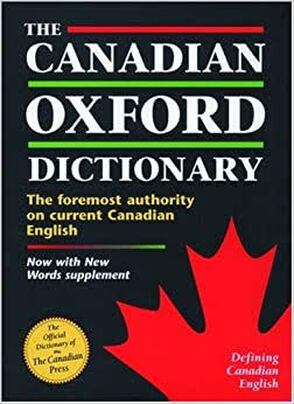 LONDON, ONTARIO – Knowing that I live in used bookshops (and never more so than in the week when we host David Warren on his annual book-buying safari to southwestern Ontario) one of our friends asked us last month to keep an eye out for a good un-woke dictionary of the English language she could buy. We zapped her along some details about a 1973 edition of the two-volume Shorter Oxford Dictionary which we found at Cardinal Books for thirty-five bucks. My own edition of the Shorter hails from 1993 and has never struck me as particularly woke but the ’73 would be an even safer bet. Clocking in at a manageable 5,000 pages, the Shorter is a comprehensive distillation of the great motherlode of the full Oxford English Dictionary which is impractically large for anyone but specialists to manoeuvre their way around. In its most readily legible form, the full OED takes up twenty fat volumes that require more shelf space (and flitting about from book to book) than most folks are prepared to put up with. Back in the ‘70s the Book-of-the-Month Club used to offer as one of their membership premiums a massive two-volume Compact Edition of the full enchilada. On each of its pages the Compact reproduced four micro-printed pages from the OED and included a magnifying glass in a special drawer in its slipcase; a visual aid which was essential for reading its miniscule text.  My wife ordered up her edition of the Compact in the late ‘70s and it’s a glorious thing to behold but a total pain in the ass to work with in a day to day sort of way. I just hauled down the first volume (“A – O”) for the first time in about thirty years. (My goodness, we used to press a lot of autumn leaves in the first years of our marriage.) And on pages 622 and 623 – comprising eight pages of the full OED and providing definitions for about a hundred and fifty words – we only advance from ‘CULMINANT’ (now there’s a word you could probably use in a few select circles and be understood) and ‘CUNCTATOR’ (which the hard of hearing might construe as a Medieval ‘Karen’.) It turns out that it actually means, “One who acts tardily.” I must admit, I initially thought that our friend was being a wee bit alarmist in her search for an un-woke dictionary. I knew that a lot of other supposed reference works were getting ideologically corrupted but – naively, I guess – I thought that scholars seeking to elucidate the definitions of words as clearly as possible wouldn’t be as susceptible in the same way to the mental rot of wokeness. Then just this week came the news that the Merriam-Webster Dictionary (never Oxford-class, I grant you, but unquestionably the foremost American dictionary) has caved to the hectoring of the ‘Big Trans’ lobby and now includes in its definition of ‘Female’ this pathetic example of mushy thinking: “Having a gender identity that is the opposite of male”. Yuck. For all of the convenience of access and wild profusion of information on the Internet, Hermaneutics readers will know that I am not one of those who decided to ditch his books and other physical media with the dawning of mass digitization. I value my shelves of reference books more than ever and am generally leery of anything published this century. A case in point is my trusty one-volume edition of J. Arthur Thomson’s The Outline of Science, originally published in 1922. Depressed, repelled or utterly bored by any modern scientific ‘breakthrough’ since the invention of air conditioning, I take sanctuary in this hundred year-old compendium of scientific knowledge. Thomson gives me all the science I need or can stand and serves it up in a context I can relate to. Wonder and poetry are woven all through 1,200 pages of accessible essays with heart-stirring titles such as The Secret of the Seed, The Mind of the Minnow, The Marvels of the Ant-Hill and The Romance of the Heavens. Science texts have the shortest shelf life of any reference books as new facts and discoveries and theories supersede the old. But it’s interesting to consider how variable reference works of all kinds can be. Even in more seemingly stable fields like history, language or the arts, there is constant movement and dispute. There is an arc of development that dictionaries, encyclopaedias and topical ‘companions’ generally go through. First there is the quirky prototype. In the English-speaking world this has often been a solo operation. To read Samuel Johnson’s 1755 English Dictionary is to explore a lost treasure house of scintillating language (“Figure-finger: a pretender to astrology and prediction”) and is also to encounter one of the great wits of his age (“Oats: a grain, which in England is generally given to horses, but in Scotland supports the people”). More recently, Eric Partridge gathered up all the vulgarisms, insults and colloquialisms that he’d heard as a soldier or discovered as an avaricious reader, and brought out his Dictionary of Slang and Unconventional English in 1937. Early editions were heavily asterisked, lending an airy appearance to page after page of linguistic ingenuity at its funniest, most vital and vulgar. Partridge’s dry, economical definitions (“Sh** to a shovel, like: Very adhesive(ly) indeed”) perfectly complement the proceedings.  Two-page spread of the ‘Compact’ OED Two-page spread of the ‘Compact’ OED During the middle period in a reference book’s progress, a committee takes over, replacing the heroic and subjective charm of earlier efforts with a span of expertise impossible to any one person. Such was that first Oxford English Dictionary produced by a team of lexicographers assembled by James Murray in 1880. Certain the job could be completed by 1895, it didn’t see publication until 1928, thirteen years after Murray’s death. But the force of his personality and plan ensured that even from the grave he remained the great project’s captain. No encyclopaedia is more honoured than the 11th edition of Encyclopaedia Britannica, which was published in 29 volumes in 1911. The edition repeats exemplary essays from earlier editions and mixes these with entries by contemporary scholars who not only shone as authorities in their fields but could also write exquisitely. The essay by Lord Macaulay on Samuel Johnson is probably the most famous entry but it’s hard to imagine better marriages between author and subject than these from the same edition: T.H. Huxley on biology, William Morris on murals, Andrew Lang on fairy tales, James George Frazer on mythology, and Lord Baden Powell on kite flying. For the third stage in a reference book’s progress, the essays often become unremarkable in expression (something to do with assigning multiple writers to single entries and the bland homogenization of language) but at least can usually be trusted to competently compile facts and present them fairly. No publisher has a better record in this regard than the Oxford University Press, but even they drop the ball sometimes. A recent Oxford Companion to Popular Music was riddled with misinformation and their Companion to Women’s Writing in the United States was a wildly stilted feminist rant. It’s a good idea when selecting reference books to take them for a little test drive by checking out a few entries that you already know a great deal about and see if they do those up with any sort of justice. It so happened that our search for an un-woke dictionary was taking place during the build-up to Canada Day when our timorous joke of a government was doing its customary best to make sure that we had nothing to celebrate; erecting fences to keep potential celebrants off the lawn around the Houses of Parliament and the Supreme Court . . . the usual Parliament Hill flyover by the Snowbirds cancelled . . . the pointlessly vindictive re-arrest and re-imprisonment of the Freedom Convoy’s Tamara Lich . . . the unveiling of a tax-payer funded booklet passing itself off as a “Values Kit” for Canadian school children which warns that the Red Ensign flag (our national flag until 1965 which thousands of Canadian servicemen died defending) is now to be regarded as a banner for white supremacists and racists . . . Prime Minister Sock-Boy’s smugly puffed-up announcement that Americans who were inconvenienced by the previous week’s overturning of Roe v. Wade were welcome to have their prenatal infants torn to pieces in Canada but . . . wait for it . . . only if they were up to date with all their ‘safe and effective’ Wuhan batflu vaccinations and boosters. Not being ashamed of Canadian history, I’ve always preferred the Red Ensign and rather resented the Liberal Party’s tendency to flash Lester Pearson’s maple leaf flag around as if it’s their corporate logo. But I started to warm to it in a whole new way this February when the brave participants in the Truckers Convoy featured it everywhere in their protest against oppressive government lockdowns and restrictions. And I’m absolutely thrilled to see that same flag turning up as an emblem of defiance that is waved about by farmers and truckers in European countries kicking back against similar persecutions by their own governments. It’s great to see Canada recognized around the world for something honourable and brave that has nothing whatsoever to do with our idiot government nor its leader’s “basic admiration” for Communist China, his poisonous affiliation with Klaus Schwab and the World Economic Forum and his petulant contention that when you get right down to it, this country doesn’t really have an identity. An identity is a lot like happiness. Consciously or deliberately sought, it can be evasive. It will not materialize on demand. And it certainly can’t be imposed by a Prime Minister who claims that “diversity is a value” and then tries to shut down anyone who doesn’t agree with him. No, an identity is something which imperceptibly develops when your mind is on other things. Never an end in itself or in isolation, it is a coincidental by-product of the work we do and the diversions we seek, of the relationships we develop, the jokes we tell and the truths we uphold.  Left utterly cold by the muted Canadian observances this year, I celebrated Canada Day by browsing through the 1700 pages of yet another distinctly un-woke dictionary, The Canadian Oxford Dictionary, edited by Winnipeg born lexicographer, Katherine Barber which came out in 1998. This delightful epiphany of a book offers up thousands of Canadianisms – terms which we’ve either developed from scratch because we needed a word to identify a certain phenomenon or thing, or common English terms which we’ve tweaked and adapted so as to give those words a distinctly Canadian meaning or spin. Some of the wonderful terms which you will not find written up quite this way in any other English language dictionary include: ‘bathtub race’ (I guess that means it won’t be recognized as an Olympic event any time soon); ‘blood donor clinic’ (the Americans sell theirs); ‘browned off’ (simmering meat as a metaphor for impatience or anger); ‘browner’ (a discreet truncation of the more explicit ‘brown-noser’); ‘buck and doe’ or ‘stag and doe’ (for co-ed events); ‘bush party’ (a venueless underage drinking party); ‘garburator’ (garbage disposal unit); ‘pencil crayon’ (coloured pencils); ‘Rep by Pop’ (the reason why Liberals rule federally though so few are elected west of the Manitoba border); ‘rez’ (short form for either a university residence or an Indian reservation); ‘scrub’ (a plot of undeveloped, uncultivated land); ‘T4’ (an income tax form); ‘T.O.’ or ‘Hogtown’ (for a certain Ontario metropolis which everyone loves to hate); ‘Tundra buggy’ (a hardy northern variant of the ‘dune buggy’); ‘two solitudes’ (characterizing relations between Quebec and ‘the rest of Canada’); and ‘Varsol’ (which everyone else calls ‘turpentine’). The American spell-checker on my computer is ‘going snakey’ (another Canadianism) with this part of my essay. Glories of Canadian cuisine are represented with such terms as ‘all-dressed’ (as in loaded hot dogs and a flavouring for potato chips), ‘bangbelly’ (a Newfoundland pancake), ‘blueberry grunt’ (a Maritime dessert), and the more widely recognized ‘cottage roll’, ‘Nanaimo bar’, ‘Montreal smoked meat’, ‘open face’ sandwich, and ‘poutine’. I’m afraid there’s nothing fanciful about a dish named ‘seal flipper pie’; that’s an exact description. The language of hooch is equally prolific, spawning ‘Screech’ (a potent Newfoundland rum); ‘stubby’ (a short-necked beer bottle); ‘two-four’ (a case of beer); ‘twenty-sixer’ (a 26 ounce bottle of liquor); ‘bloody Caesar’ (a variation on the ‘bloody Mary’ which substitutes tomato-clam cocktail for tomato juice); and ‘beer parlour’ (like ‘body rub parlour’, an instance of dressing up vice in prim language). Canadians euphemistically classify drunk driving as ‘impaired driving’. Not listed here is ‘ladies & escorts’, the old designation for the ladies wing of Canadian bars. ‘Drop the gloves’, ‘faceoff’, ‘rag the puck’, ‘hang up the skates’, ‘spin-a-rama’, ‘stickhandle’, ‘hockey mom’ and ‘hockey tape’ are just a few of the terms relating to Canada’s national sport. I once heard that ‘hoser’, that uniquely Canadian term of abuse made famous by Bob and Doug MacKenzie of SCTV fame, was a poke at fellas who stood for freezing hours in their backyards, hose in hand, making ice rinks. But the C.O.D. (even this dictionary’s acronym reeks of Canada) defines ‘hoser’ as “an unintelligent, inarticulate, beer-drinking lout.” My Welsh grandfather tried to ride out the London flood of 1937 with a bottle of brandy in the attic of his Wilson Ave. apartment, repeatedly vowing he’d happily drown before setting foot in one of those wobbly ‘Canadian canoes’ that the rescue parties were paddling throughout London West on that inundated April evening. We always assumed he was just being ornery and proud but according to an entry under ‘Canadian canoe’, it turns out he was just being etymologically correct. You know you’re reading a Canadian dictionary when a single page offers up entries for both ‘Northrop Frye’ and ‘fuddle duddle’. My late uncle, Jack Robertson, was the Hansard reporter in Parliament on the day of wee Justin’s father’s famous slip of the tongue. Forbidden by Parliamentary protocol to speak, he could only shake his head from side to side as opposition members badgered him to read out what the Prime Minister had actually said. In private he assured us that Trudeau’s original utterance was . . . well, let’s say it can be found on the same page of the C.O.D., nine entries before ‘fuddle duddle’.
3 Comments
Max Lucchesi
23/7/2022 10:19:22 am
Good to see you in such fine form, but surely science has progressed since 1922 however much you may wish it had not. Stubby was filched from Strine, at least it was from a Aussie I first heard it years ago together with a tinny. If I may I'll add a couple of definitions from Bierce's Devils Dictionary. Canonicals. The motley worn by the jesters of the kingdom of heaven. Loquacity. A disorder which renders the sufferer unable to curb his tongue when you wish to talk. Or the Tory Party's latest unwoke definition of Woman. A person who has a kneetrembler with Boris while Carrie isn't looking.
Reply
Angela Schaffelburg
23/8/2022 05:35:01 am
Greetings Herman,
Reply
Herman Goodden
23/8/2022 10:31:38 am
Oh my goodness, right you are. As an utterly lame defense, I seem to have conflated the publication date with Thomson's Outline of Science which I mention several paragraphs earlier. I will adjust the text forthwith. Thanks for the correction.
Reply
Your comment will be posted after it is approved.
Leave a Reply. |
HERMANEUTICS
If you would like to contribute to the ongoing operations of Hermaneutics, there are now a few options available.
ALL LIFE IS A GIFT :
THE IMPORTANCE OF TRADITION :
Archives
June 2024
Categories
|

 RSS Feed
RSS Feed